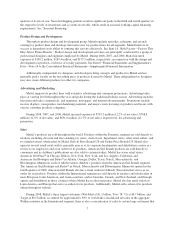Mattel 2008 Annual Report Download - page 21
Download and view the complete annual report
Please find page 21 of the 2008 Mattel annual report below. You can navigate through the pages in the report by either clicking on the pages listed below, or by using the keyword search tool below to find specific information within the annual report.market. Mattel’s retailer customers may be less willing to purchase Mattel products or to provide marketing
support for those products, such as shelf space, promotions, and advertising, or have imposed or may impose
additional requirements or product changes that would adversely affect Mattel’s business operations, decrease
sales, and increase costs. Product recalls, withdrawals, or replacements may also increase the amount of
competition that Mattel confronts from other manufacturers. Some competitors may attempt to differentiate
themselves from Mattel by claiming that their products are produced in a manner or geographic area that is
insulated from the issues that preceded recalls, withdrawals, or replacements of Mattel products. To the extent
that competitive manufacturers choose not to implement enhanced safety and testing protocols comparable to
those that Mattel has adopted, those competitors could enjoy a cost advantage that will enable them to offer
products at lower prices than those charged by Mattel.
Adverse governmental actions, including new legislation and regulations, may materially and adversely
affect Mattel.
As a result of product recalls, withdrawals, or replacements, Mattel has been the subject of governmental
actions, inquiries, and proceedings in several countries. Mattel has incurred expenses to respond and has
experienced adverse effects on its business, including temporary suspension of its ability to import products into
various countries and to export certain products from China. Product recalls, withdrawals, or replacements have
resulted in increased governmental scrutiny of Mattel products. There can be no assurance that Mattel will not be
subjected to future governmental actions and scrutiny that may lead to fines, penalties, settlements, increased
costs or interruptions or disruptions of its normal business operations. Regulatory agencies and legislatures in
various United States and foreign jurisdictions have undertaken reviews of product safety, and have enacted or
are considering various proposals for additional, more stringent laws and regulations governing certain children’s
products. In particular, the United States Congress has enacted the Consumer Product Safety Improvement Act of
2008, which imposes significant new requirements on the toy industry and the products Mattel produces, as well
as enhancing penalties of noncompliance. Some of the new legal mandates may materially decrease Mattel’s
sales, increase its costs or otherwise have a material adverse effect on Mattel’s business.
Mattel is subject to various laws and government regulations, violation of which could subject it to
sanctions. In addition, changes in such laws or regulations may lead to increased costs, changes in Mattel’s
effective tax rate, or the interruption of normal business operations that would negatively impact Mattel’s
financial condition and results of operations.
Mattel operates in a highly regulated environment in the US and international markets. US federal, state and
local governmental entities, and foreign governments regulate many aspects of Mattel’s business, including its
products and the importation and exportation of its products. These regulations may include accounting
standards, taxation requirements (including changes in applicable income tax rates, new tax laws and revised tax
law interpretations), trade restrictions, regulations regarding financial matters, environmental regulations,
advertising directed toward children, safety, product content, and other administrative and regulatory restrictions.
While Mattel takes all the steps it believes are necessary to comply with these laws and regulations, there can be
no assurance that Mattel will be in compliance in the future. Failure to comply could result in monetary liabilities
and other sanctions which could have a negative impact on Mattel’s business, financial condition and results of
operations.
In addition, changes in laws or regulations may lead to increased costs, changes in Mattel’s effective tax
rate, or the interruption of normal business operations that would negatively impact its financial condition and
results of operations.
17
























